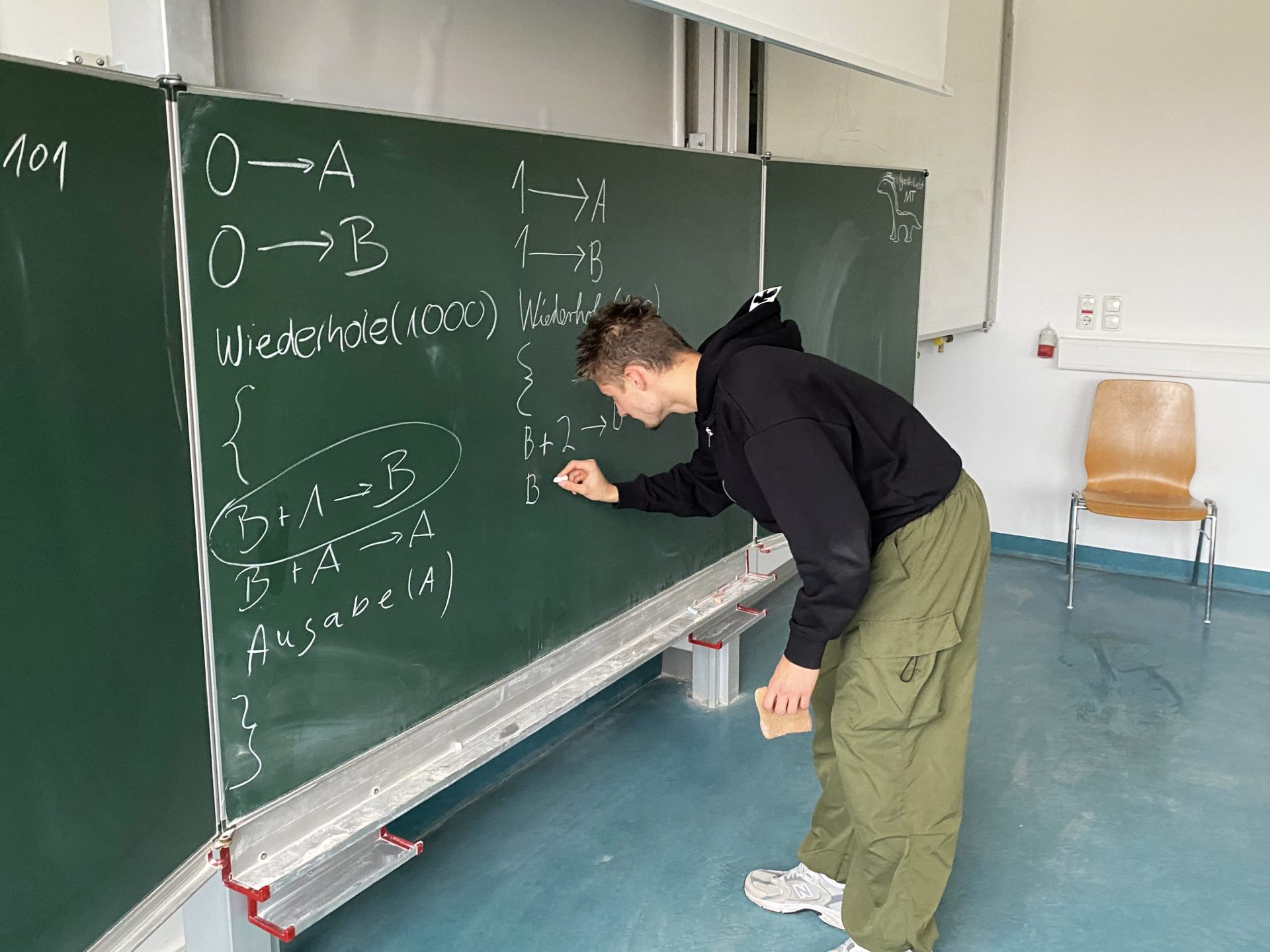NEWS
Neue Programmiermethode für Einsteigende – Erfolgreiche Einführung im Bachelor Medizintechnik
Der Forschungscampus STIMULATE freut sich, die erfolgreiche Erprobung einer innovativen Programmiermethode für Schüler:innen und Studienanfänger:innen im Rahmen eines Schulbesuchs in der Vorlesung „Methoden in der Medizintechnik“ von Prof. Dr. Georg Rose bekanntzugeben. Ziel dieser Methode ist es, den Einstieg in die Programmierung zu erleichtern und insbesondere den Herausforderungen entgegenzuwirken, die viele Erstsemesterstudierende beim Einstieg in die Programmierung haben. Herausforderungen stellen häufig die hohe Komplexität von Programmierumgebung da, der große Sprachumfang gängiger Programmiersprachen, welcher darüber hinaus auf der englischen Sprache basiert sowie die prinzipiell sehr formale Denkweise bei der Implementierung von Software.
Die von Prof. Rose entwickelte Methode setzt auf eine vereinfachte Programmierung mit einem kleinen Befehlssatz in deutscher Sprache mit klaren, leicht verständlichen und sehr logischen Befehlen. Darüber hinaus kann man den Code und den simulierten Computer mit seinem Speicher beobachten, so dass alle Abläufe auf einen Blick erfassbar sind. Um maximale Flexibilität zu gewährleisten, wurde der zugehörige Compiler als plattformunabhängige HTML-basierte Webanwendung entwickelt. Dadurch kann das Tool auf allen Betriebssystemen – Windows, macOS und Linux – direkt im Browser genutzt werden.
Nachdem Prof. Rose eine erste Version des Systems für das Windows-Betriebssystem programmiert hat, unternahm Peter Knüppel, der den Studiengang Bachelor Medizintechnik mit aufgebaut hat und diesen von Anfang an koordiniert, den Versuch, es im Dialog mit ChatGPT als Web-Anwendung zu entwickeln. Zum großen Erstaunen der beiden Entwickler hat ChatGPT das gesamte Programm im Dialog mit Hr. Knüppel innerhalb von ca. einer Stunde entwickelt. Kleinere Fehler und Optimierungen konnten innerhalb weniger Minuten durch weitere Bitten an ChatGPT mühelos erzielt werden.
Die Rückmeldungen sowohl von den Schüler:innen als auch von den Erstsemesterstudierenden waren äußerst positiv: Sie lobten die intuitive Bedienbarkeit, welche nicht von dem eigentlichen Problem ablenkte, sowie die leicht einprägsamen Befehle und Programmierung. Die Studierenden, welche noch keine Programmiererfahrungen hatten, waren von den schnellen Lernerfolgen begeistert. Auch die Dozenten freuten sich, als sogar einer der Schüler aus der Besuchsgruppe eine in der Vorlesung gestellte Übungsaufgabe auf der Basis der neuen Programmiersprache schnell gelöst hatte und sein Programm an der Tafel den Studierenden korrekt erläuterte (Foto).
Der Forschungscampus STIMULATE sieht in dieser Methode großes Potenzial, um den Zugang zur Programmierung nicht nur in der Medizintechnik, sondern auch in anderen technischen und naturwissenschaftlichen Disziplinen zu erleichtern. Wir bedanken uns bei allen Teilnehmenden für ihr Engagement und freuen uns darauf, die Methode weiterzuentwickeln und zu verbreiten.
New programming method for beginners - successful introduction in the Bachelor of Medical Engineering programme
The Research Campus STIMULATE is pleased to announce the successful testing of an innovative programming method for pupils and first-year students as part of a school visit to Prof Dr Georg Rose's lecture ‘Methods in Medical Engineering’. The aim of this method is to facilitate the introduction to programming and, in particular, to counteract the challenges that many first-semester students face when starting out in programming. Challenges are often posed by the high complexity of the programming environment, the wide range of common programming languages, which are also based on the English language, and the generally very formal way of thinking when implementing software.
The method developed by Prof Rose is based on simplified programming with a small command set in German with clear, easy-to-understand and very logical commands. In addition, the code and the simulated computer with its memory can be observed so that all processes can be recognised at a glance. To ensure maximum flexibility, the associated compiler was developed as a platform-independent HTML-based web application. This means that the tool can be used directly in the browser on all operating systems - Windows, macOS and Linux.
After Prof. Rose had programmed an initial version of the system for the Windows operating system, Peter Knüppel, who helped set up the Bachelor of Medical Technology course and has coordinated it from the outset, attempted to develop it as a web application in dialogue with ChatGPT. To the great astonishment of the two developers, ChatGPT developed the entire program in dialogue with Mr. Knüppel within about an hour. Minor errors and optimisations were easily achieved within a few minutes by further requests to ChatGPT.
The feedback from both the pupils and the first-semester students was extremely positive: they praised the intuitive usability, which did not distract from the actual problem, as well as the easy-to-remember commands and programming. The students who had no programming experience were enthusiastic about the quick learning success. The lecturers were also delighted when even one of the students from the visiting group quickly solved an exercise task set in the lecture based on the new programming language and correctly explained his programme to the students on the blackboard (photo).
The Research Campus STIMULATE sees great potential in this method to facilitate access to programming not only in medical technology, but also in other technical and scientific disciplines. We would like to thank all participants for their commitment and look forward to further developing and disseminating the method.
